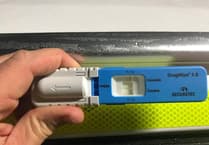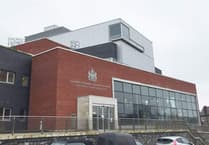Shoplifting increased across mid and north Wales as the cost-of-living crisis ramped up, figures suggest – though police-recorded thefts remain below pre-pandemic figures.
Much of 2022 has been dominated by surging inflation, rising food prices and soaring energy bills, which have left many households across the UK reassessing how they are going to pay the bills.
An issue that was already bubbling away last year as the price of goods started outstripping wage growth, the cost-of-living crisis was exacerbated by Russia's invasion of Ukraine in February, which escalated food and energy prices across the globe.
Reports suggested the rising cost of living could lead to higher levels of shoplifting as pay packets are spread more thinly.
And figures obtained through a Freedom of Information request by RADAR reveal Dyfed-Powys Police recorded 718 shoplifting offences between 1 April and 31 August this year.
Although that was a rise of 27.3 per cent compared to the 564 logged during the same period last year, the force recorded 737 thefts from shops over the five-month period in 2019 – 19 more.
And North Wales Police recorded 1,655 shoplifting offences in the same April to August period - a rise of 26.8 per cent compared to the 1,305 logged during the same period last year. The force recorded 1,880 thefts from shops over the five-month period in 2019 – 225 more.
Police forces were asked to provide the number of shoplifting offences recorded between the start of April and end of August, as well as the outcomes of such crimes.
Across England and Wales, 109,534 shoplifting offences were reported to the 38 police forces which responded to the FOI request – 22 per cent more than last year, but a drop of 17.9 per cent compared to 2019.
Between April and August, 85 (11.8 per cent) shoplifting crimes resulted in a charge or summons in Dyfed-Powys, suggesting a significant proportion led to no suspect being charged – though some may still have been under investigation at the time of the request.
For North Wales, 205 (12.4 per cent) resulted in a charge or summons, meaning a significant proportion led to no suspect being charged – though 416 had not been assigned an outcome at the time of the request.
In response to rising wholesale gas prices, Ofgem raised the energy price cap for the typical UK household by more than 50 per cent on 1 April, before putting it up again at the start of October.
Some major supermarkets reported that they were boosting security due to fears of an increase in shoplifting as household bills rose.
Sabine Goodwin, coordinator of the Independent Food Aid Network, which comprises independent food banks across the UK, said people are becoming "more and more desperate" as the cost-of-living crisis exacerbates pre-existing poverty in Britain.
"People are being faced with impossible choices as food insecurity spirals out of control," she said.
"The solution is for the government to ensure there are direct one-off payments through this winter as well as the adequacy of social security payments and wages."
But the British Retail Consortium, which represents retailers in the UK including big-name food stores, said shoplifting remains a "significant" burden, costing retailers £663 million in 2020-21.
Tom Ironside, BRC director of business and regulation, said police-recorded crimes do not represent the whole picture as some staff are reluctant to report incidents due to "a lack of police response".
"It’s not just the financial cost of theft which is important, customers and store staff can be left traumatised by such incidents, particularly where violence is involved," he added.
The National Police Chiefs' Council said shoplifting is the "single biggest threat" to shop worker safety, as well as being a daily problem for retailers.
Assistant Commissioner Paul Betts, NPPC lead for business crime, said: "We are conscious of concerns from business about the potential for increased shoplifting due to the cost-of-living crisis and recognise the important role that policing plays in tackling offenders and supporting retailers in reducing the number of offences committed and in keeping their staff safe."





Comments
This article has no comments yet. Be the first to leave a comment.